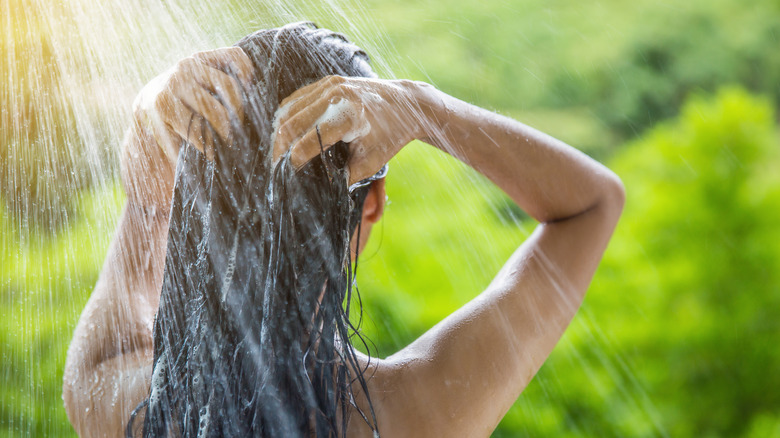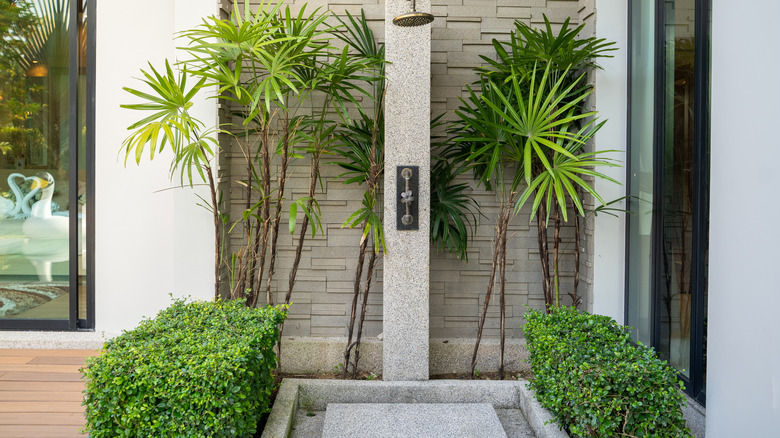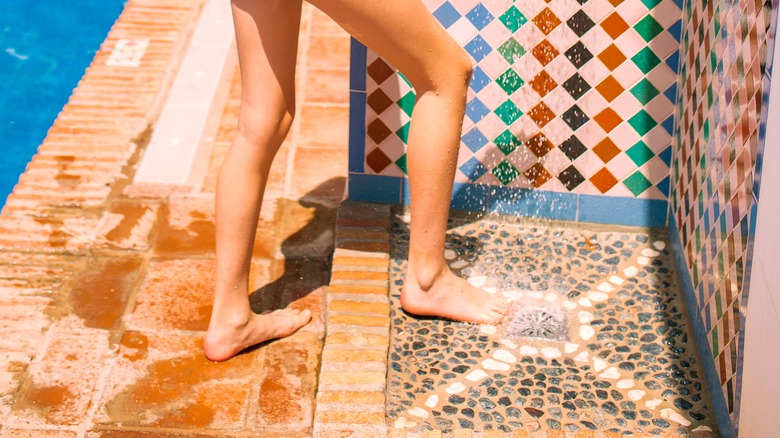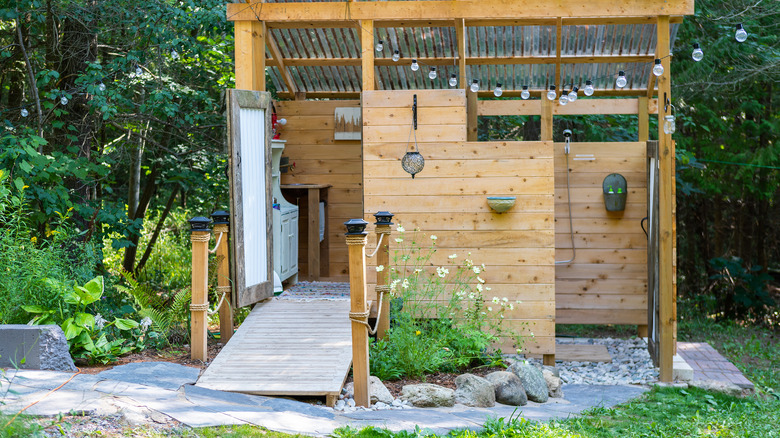What To Consider Before Installing An Outdoor Shower
Going outside for just a few more minutes every day can have amazing benefits for your health and well-being. According to the American Psychological Association, being in nature can lower stress levels, improve memory and cognition, stabilize your mood, and make you feel more connected to the world around you. If you've ever taken a hot shower after a long, hard day, you know how refreshing and rejuvenating a little self-care can be too. Science says that's because hot water raises your core body temperature, helping your body align with circadian rhythm (via The Guardian). Now imagine taking a relaxing, hot shower in the sunshine and fresh air, and you've got a winning combo that's guaranteed to make you feel amazing.
An outdoor shower is the ultimate mood-boosting experience, and you can enjoy it every day when you build your own, but there are some technical aspects to consider. After all, how private can an outdoor shower really be? Where does all the soapy water flow, and how can you deal with insects? From practical plumbing to aesthetic touches, here's what you need to consider before taking the plunge into building your own outdoor shower.
Choosing the perfect location
Privacy, usability, and sanitation can all be affected by location, so it's one of the most important decisions you can make regarding your outdoor shower. First, you'll want to place your outdoor shower in an area that gets direct sunlight every day to prevent algae and mold problems. According to Mold Master, one to three hours of direct sunlight should deliver enough UV rays to kill any mold or fungi that could develop on the walls or floor. Sunlight will also make the shower more comfortable to use, even if you have hot water hookups.
Next, consider whether you want to build the shower as an attachment to your house or in a separate area, like the garden. If you plan to shower nude, would you like to be able to access the shower from your bathroom or bedroom? Or would you rather have it near the pool, so it's convenient to rinse off after a swim? An outdoor shower that's separate from your home will generally require more plumbing and building materials, but an attached shower will require you to waterproof the side of your house.
Building your outdoor shower
After you've nailed down the perfect location for your shower, it's time to think about plumbing, materials, and construction. For a low-budget option, you can connect your garden hose directly to the shower line. However, if you want hot water, Dream Outdoor Living recommends investing in a tankless gas water heater or solar water heater. You'll also need a shut-off valve and drain valve to decommission your shower in winter and keep the pipes from freezing. If you aren't planning to use soaps in the shower, you can recycle the water into a nearby garden, but if you want to use soaps in the shower, you'll need to drain it into your home's greywater system.
For the shower itself, you'll need durable, easy-to-clean, and non-slip surfaces. Non-slip floors are super important, especially if you plan to use soaps or your shower is in a shady area with more potential for algae. Wood may be a classic shower building material, but it can be slippery when wet, foster bacteria, and rot over time. Instead, opt for bamboo, mosaic tiles, wood-look tile, river stones, or concrete that matches your patio and pool space. Finally, privacy is a major factor when designing a peaceful shower space. Even if you plan to wear a bathing suit, most people don't want their neighbors peeping in. For extra coverage, consider building all-around walls with a door. For a more open-air feeling, plant palms, hedges, or bamboo around the shower.
Adding luxurious touches
An outdoor shower shouldn't feel the same as standing under a water hose; you want your beautiful shower to blend in with its natural surroundings and feel like an extension of your home. One way to make the space more appealing is to add some of the same elements you'd find in an indoor shower, such as hooks and shelves for shampoo, loofahs, and dry towels. Indulge in some eco-friendly soaps, burn citronella candles, and stock up on essential oils to eradicate moths, mosquitoes, and other pests. Decorating your shower with humidity-loving plants and string lights can also add a warm, charming vibe and make the shower more usable after dark; just be sure to hang the lights where they won't contact the water to avoid electrical hazards.
If you really want to get fancy with it, bathroom designer Blanche Burger recommends building a small room just off of the shower to create space for drying off, changing, and storing necessities (via Property24). Bluetooth speakers or an outdoor bathtub are two more additions that will ensure your outdoor shower is more than just a fancy home feature — it's an enticing experience



